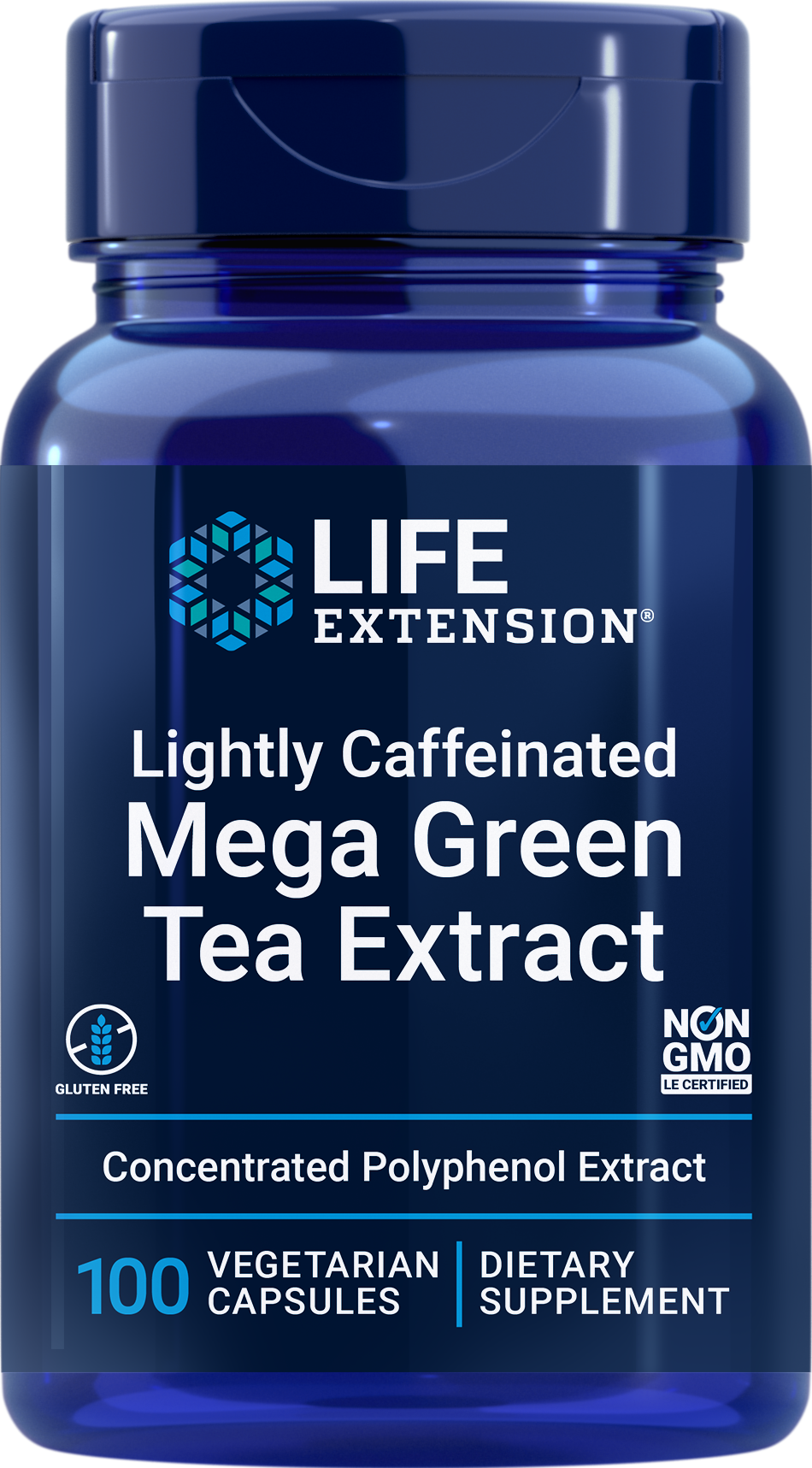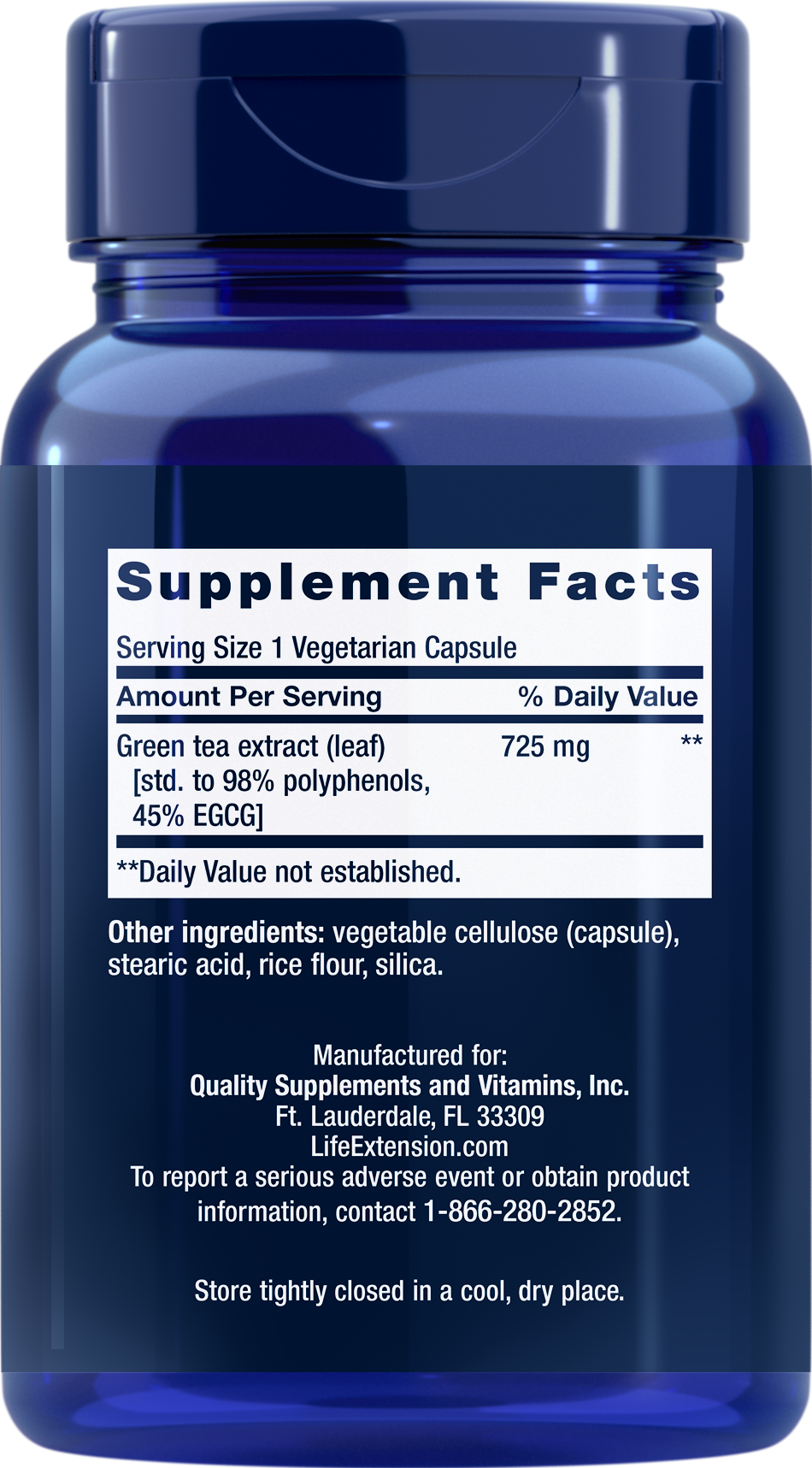Lightly Caffeinated Mega Green Tea Extract
Packed with powerful polyphenols
Lightly Caffeinated Mega Green Tea Extract
Packed with powerful polyphenols
For you if you are interested in a powerful green tea antioxidant with numerous benefits
The powerful nutrients of Lightly Caffeinated Mega Green Tea Extract can:
- Provide over 325 mg of potent EGCG
- Promote cardiovascular & cognitive health
- Encourage metabolic function and weight loss
- Support cellular health and longevity
- Offer strong antioxidant protection to fight oxidation
- Help enhance the immune function
Lightly Caffeinated Mega Green Tea Extract is packed with powerful plant compounds called polyphenols, the most well-characterized of which is EGCG, which can benefit our bodies in multiple ways. Green tea has been extensively researched and proven to have numerous healthy effects, among which we find anti-aging properties. The formula provides more of these potent compounds than the equivalent of several cups of green tea in a lightly caffeinated supplement.

on orders over € 69
We have a 100 days return policy, not the standard 30 days!
Order before 11:00 CET, for same day shipping (Mon-Fri)
We can help you in 6 languages
Polyphenols compounds & EGCG
Green tea is loaded with plant compounds called polyphenols, the most well-characterized of which is EGCG. EGCG forms a powerful antioxidant, which has been subjected to extensive scientific research and found to be much more potent than vitamins C and E.
Among the abundant health-promoting properties of EGCG is healthy cell reproduction, (1) metabolic function, and cardiovascular health support. (2)
EGCG can also help protect brain health, (3) benefit immune system function, and help promote a healthy body weight. (4,5)
One cup of green tea provides roughly 150-300 mg of polyphenols (6) and has antioxidant effects that are greater than a serving of broccoli, spinach, carrots, or strawberries.
Each capsule of Lightly Caffeinated Mega Green Tea Extract, EU provides 725 mg of green tea extract, which is the equivalent of more than three cups of green tea. This 98% green tea extract is standardized to provide high antioxidant potency, using the most important polyphenol of green tea.
Moreover, green tea powdered extracts have been shown to absorb 60%-90% better into the bloodstream and to be far more bioavailable than drinking green tea.
The benefits of green tea
Green tea has been shown to provide many benefits including:
- Protects against oxidation: Green tea polyphenols are capable of directly neutralizing destructive free radicals and are also thought to boost the body's own internal oxidative stress defenses. They've also been shown to inhibit oxidative stress. (7-9)
Cellular health support: Green tea supports healthy cellular proliferation. (1) In fact, the green tea polyphenol EGCG has a remarkably broad array of cellular health benefits, exerting a positive influence on mitochondrial health, intracellular signaling pathways, intracellular messengers, transcription factors, healthy gene expression and more. (10)
Cholesterol management: Green tea, green tea extracts and EGCG can help maintain already-healthy blood cholesterol, LDL and triglyceride levels. (11,12)
Neuroprotection and metabolic health: Green tea and its polyphenols, including EGCG, help protect nerve cells and nerve function, have been shown to help preserve metabolic health, and help maintain already-healthy glucose levels. (13-15)
Also: Fluid-stabilising properties, promoting weight loss, boosting the effectiveness of enzymatic phase II detoxification, and enhancing immune function.
An advanced extract
Lightly Caffeinated Mega Green Tea Extract has been concentrated and dual standardised to ensure the highest quality, consistency and biological activity.
This advanced extract contains 98% total polyphenols and 45% epigallocatechin-3-gallate (EGCG).
Serving size: 1 vegetarian capsule
Servings per container: 100
Amount per serving:
| Green tea extract (leaf) [std. to 98% polyphenols by UV (710.5 mg), 45% EGCG by HPLC (326.25 mg)] | 725 mg |
Other ingredients: vegetable cellulose (capsule), stearic acid, rice flour, silica.
Non-GMO
Dosage and use:
Take one capsule per day with food.
Each serving contains approximately 25 mg of caffeine (the amount found in 2/3 cup brewed green tea).
Warnings:
Do not consume a daily amount of 800 mg of (-)-epigallocatechin-3-gallate or more. Should not be consumed on an empty stomach, by pregnant or lactating women and children below 18 years old and if you are consuming other products containing green tea on the same day.
Keep out of reach of children.
Do not exceed recommended daily dose.
Do not purchase if outer seal is broken or damaged.
If you are undergoing treatment for a medical condition, please consult your medical practitioner first.
A food supplement should not be used as a substitute for a varied and balanced diet and a healthy lifestyle.
Store tightly closed in a cool, dry place.
- Journal of cancer prevention. 2015;20(1):1-4.
- International Journal of Cardiology. 2016;202:967-974.
- Current Drug Targets. 2017;18(2):174-195.
- Biochemical pharmacology. 2011;82(12):1807-1821.
- International Journal of Obesity. 2009;33(9):956.
- Expert opinion on drug discovery. 2011;6(6):589-595.
- Clinical Nutrition. 2006;25(5):790-796.
- Life Sci. 2013;93(8):307-12.
- Life Sci. 2010;86(25-26):907-18.
- Redox Biol. 2014;2:187-95.
- Food science and technology research. 2017;23(5):627-636.
- Clinical Nutrition. 2016;35(3):592-599.
- Applied Physiology, Nutrition, and Metabolism. 2016;41(10):1057-1063.
- Journal of Biological Chemistry. 2002;277(38):34933-34940.
- BMC Pharmacology. 2004;4(1):18.



